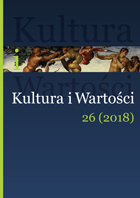Treść, pojęcie, realizm. Heglowskie rozumienie poznania zmysłowego
Content, notion, realism. Hegel’s understanding of perceptual cognition
Author(s): Paweł SikoraSubject(s): Metaphysics, Epistemology, 19th Century Philosophy, German Idealism, Phenomenology, Ontology
Published by: Wydawnictwo Naukowe Uniwersytetu Marii Curie-Sklodowskiej
Keywords: Hegel; perception; epistemological realism; perceptual knowledge; perceptual content; object of experience;
Summary/Abstract: The author reviews the Hegelian construction of sense knowledge: the empirical content of the object and its general character. He argues that Hegel’s standpoint has to be to some extent compatible with the basic thesis of epistemological realism on the sense consciousness level. Yet at the same time Hegel’s concept of experience denotes a conceptual character of perceptual contents. This is possible thanks to a gradual process of recognizing the non-empirical elements of consciousness, as well as to the pattern in which the reality of the experience is feasible only within the ideal reality of Geist thinking. However, in the process of experience such an understanding of the Hegelian standpoint requires distinguishing improper reality (I line) from proper reality (II line). The interpretation proposed in this article appears to be well tuned with Hegel’s conception of a synthesis combining respective types and levels of knowledge, including sense knowledge.
Journal: Kultura i Wartości
- Issue Year: 2018
- Issue No: 26
- Page Range: 119-134
- Page Count: 16
- Language: Polish

